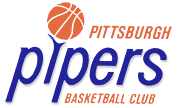
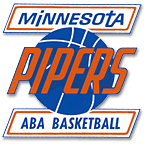
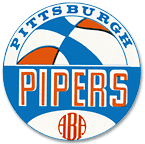

|
Pittsburgh/Minnesota PipersYears of existence:
|
Back to "Remember the ABA" Main Page
Did you see a Pittsburgh or Minnesota Pipers game? Or, did you have a favorite Pipers player? Contribute to this web page by
The Pittsburgh Pipers started out with a bang in the ABA's inaugural year, winning the first ABA Championship. Three major reasons for the Pipers' initial success were Connie Hawkins (future
Hall of Famer), Charlie Williams, and Chico Vaughn. Before playing
for the Pipers, Hawkins had played for the old Pittsburgh Renaissance of
the defunct American Basketball League. Hawkins came to the ABL Rens from
the University of Iowa where, in his freshman year, he was linked to a bribery
scandal. It was never proven (or even suggested) that Hawkins accepted money,
but he was charged with the indiscretion of "failing to report a bribe." Iowa
expelled him and the NBA blacklisted him. After playing for the Rens,
Hawkins played for the Harlem Globetrotters. The ABA finally gave Hawkins
the chance to play competitive professional basketball once again.
Charlie Williams, a feisty guard, was in a similar position. Before the ABA began its first season, Williams was set to play for the NBA's Seattle SuperSonics. However, Williams was also banned from the NBA for failure to report a bribe in college. The Pipers were the perfect opportunity for both of these players. The addition of veteran Chico Vaughn, a talented guard who had played for the St. Louis Hawks and the Detroit Pistons, gave the Pipers the best backcourt combination in the new league.
The Pipers cruised in the first ABA season under coach Vince Cazzetta, winning 54 games. Hawkins dazzled ABA fans with a variety of creative scoop shots and slam dunks. He ended up leading the ABA in scoring, with 26.8 ppg. The "Hawk" also placed fourth in the league in assist, with 4.6 apg. The Pipers had a twelve game winning streak. At another point in the 67-68 season, they won 18 out of 19 games. Attendance-wise, the Pipers were also impressive, averaging about 3,200 per contest. On January 26, 1968, the Pipers drew a league record 12,300 fans for their game against the Minnesota Muskies.
In the playoffs, the Pipers dominated every team except the New Orleans Buccaneers. During the playoffs, the Pipers shot 49% on their 2 pt. field goal attempts, and averaged 117.4 points per contest. Hawkins himself scored 419 points during the course of the playoffs, averaging 29.93 ppg. In the ABA Finals, the Pipers had to win Game 6 on the road at New Orleans. Behind Hawkins, the Pipers won that game, and before 11,457 fans at the Pittsburgh Civic Arena for Game 7, Pittsburgh won the Championship, 122-113.
For the ABA's second season, the Pipers inexplicably moved to Minneapolis, to become the Minnesota Pipers. Bill Erickson, a 38 year old Minneapolis businessman and attorney, bought a majority interest in the Pipers and brought them in to the midwest. The year before, the Muskies franchise had played its games in Minneapolis. The Muskies experienced financial difficulties and poor attendance, and moved to Miami after the first season. The Pipers decided that they could succeed where the Muskies had failed.
The Pipers' second season turned out to be a disaster. They started out with a good record, and grabbed first place. However, Hawkins, Charlie Williams, Chico Vaughn, and center Art Heyman suffered serious injuries. The Pipers' new coach, Jim Harding, ran his players into the ground during frequent and long practices. Injured Pipers rarely had a chance to recuperate, and healthy Pipers became tired during the late stages of games. Because the Pipers started out well in their second season, Harding was selected to coach the East All-Star team in Louisville, Kentucky. But at the All-Star Banquet before the game, Harding physically attacked Gabe Rubin, the Chairman of the Pipers. According to Basketball Weekly magazine, Harding was swinging at Rubin and Rubin retaliated by scratching and clawing Harding. Needless to say, Harding was fired on the spot. General Manager Vern Mikkelsen took over the team for a while, until Gus Young was named the new head coach of the franchise.
With all the chaos surrounding it, the team played poorly, even when Connie Hawkins was healthy. Bad weather in Minneapolis and Duluth (where the Pipers played several games) severely hurt attendance. Even when the weather was nice, though, the Pipers had trouble drawing fans. On March 6, 1969, the Pipers lowered lowered ALL ticket prices to just $2.00, hoping to draw crowds. The new price failed to draw fans. By the end of the season, the Pipers had lost an estimated $400,000, and many speculated that the team would move to Jersey City on the East Coast.
Instead, the Pipers once again did what everyone least expected--they moved back to Pittsburgh. By this time, however, Hawkins had decided to leave the troubled team. He signed with the Phoenix Suns of the NBA, after the NBA rescinded its ban against him. The Pipers' third season was just as bad as their second. Fans were reluctant to support the team, since it had abandoned Pittsburgh just a year earlier. Injuries hit the team once again, including a serious knee injury to Charlie Williams. New coaches John Clark and Buddy Jeanette always seemed frustrated with their team. On February 21, 1970, Jeanette slapped substantial fines on all of his players after they lost a home game to the Indiana Pacers, 130-110. About the only bright spots in the Pipers' 1969-70 season were talented rookies John Brisker and George Thompson. Brisker averaged 21. 0 ppg that year.
|
|
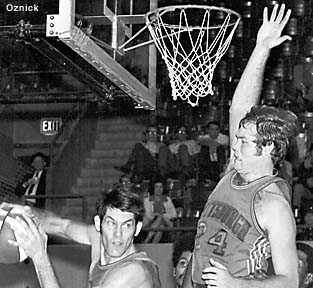
|
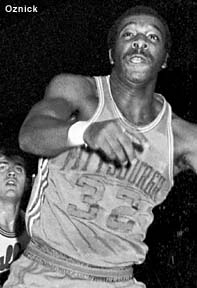 |
Guard Charlie Williams (above left, #44), a survivor from the Pipers' first year in Pittsburgh, averaged a strong 19.5 points per game during the 1969-70 season.
Another original Pittsburgh Piper, Tom "Troooper" Washington (left, #32), struggled after the team's return to Pittsburgh. He was traded to the Los Angeles Stars in the middle of the season. Relative newcomer Mike Lewis (above right, #24) was an animal on the boards for both the Pipers and Condors. He averaged 13.5 boards per game for the Pipers in 1969-70, and 14. 6 boards per game for the Condors in 1970-71. Photos Copyright © John Oznick and used with permission. |
After their third year, the Pipers stayed in Pittsburgh but became the "Condors," one of the least successful teams in ABA history.
Pipers 1968-69 Road Warmup |
Pipers 1969-70 Road Warmup |
Pipers 1969-70 Road Uniform |
1967-68 Season (Pittsburgh Pipers)
Record: 54-24, First Place in Eastern Division
1968 Playoff Results:Eastern Division Semifinals vs. Indiana Pacers (38-40)
Pipers won series, 3-0Eastern Division Finals vs. Minnesota Muskies (50-28)
Pipers won series, 4-1ABA Championship vs. New Orleans Buccaneers (48-30)
Pipers won ABA Championship, 4-3
Record: 36-42, Fourth Place in Eastern Division
1968 Playoff Results:Eastern Division Semifinals vs. Miami Floridians (43-35)
Floridians won series, 4-3
Record: 29-55, Fifth Place in Eastern Division
Missed Playoffs